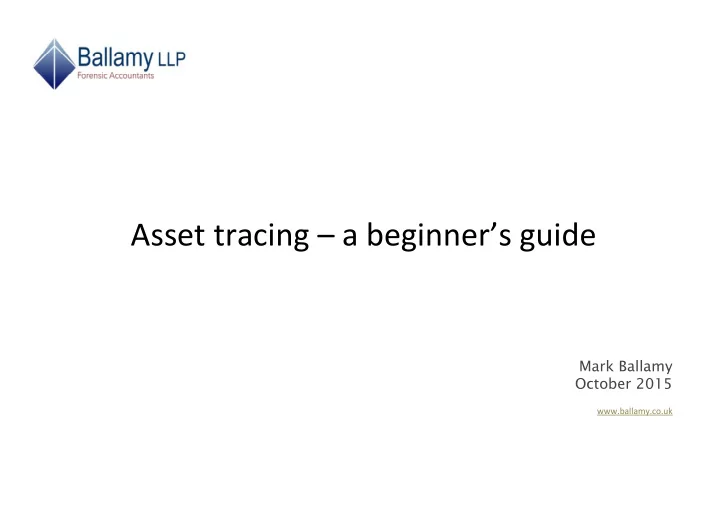

Asset tracing – a beginner’s guide ������������ ������������ www.ballamy.co.uk
What is asset tracing? It is the process of identifying assets which represent those which were initially misappropriated as a result of fraud.
English law contains two sets of rules: the rules of common law (which recognises legal title) the rules of equity (which recognises beneficial interests)
Who may a victim of fraud sue? Perpetrators Accessories Recipients of the proceeds of fraud
Limitations of tracing money at common law Electronic payments Mixed funds
Tracing money in equity I • it was the victim’s money to start with, and • the defendant received the same money.
Tracing money in equity II the mixed fund rule the rule in Re Hallett’s Estate the rule in Re Oatway the lowest intermediate balance rule the overdraft rule the rule in Clayton’s case
Straightforward transaction Victim’s bank account Fraudster’s bank account Day 1 £100
Mixed fund Victim’s bank account Fraudster’s bank account £80 Day 1 £100 £50 £70
Re Hallett’s Victim’s bank account Fraudster’s bank account Day 2 £70 – Living Expenses Day 1 £100 Day 3 £50 £80 – Asset
Re Oatway Victim’s bank account Fraudster’s bank account Day 2 £80 – Asset Day 1 £100 £50 Day 3 £70 – Living Expenses
The lowest intermediate balance rule Victim’s bank account Fraudster’s bank account £30 £30 Day 1 Day 2 £70 – Living £50 £100 Expenses £100 £100 Day 4 £110 – Asset £50 Fraudster’s own money £50 £50 Day 3 £30
The Overdraft Rule Victim’s bank account Fraudster’s bank account Day 1 £100 Day 3 Fraudster’s own money £80 – Asset £50 Day 2 Overdrawn £30
Rule in Clayton’s case I Victims’ bank accounts Fraudster’s bank account £100 Victim 1 Day 1 Victim 4 - £70 – Living Day 5 £40 Expenses Victim 2 Day 2 Victim 3 - £50 Day 6 £20 £100 – Asset Total Victim 2 - Day 3 £40 – Living Day 7 £50 £210 £20 Victim 3 Expenses Victim 1 = £30 Victim 1 - Victim 2 = £50 Day 4 £100 Victim 3 = £20 Victim 4 £40 Victim 4 = £0 Total = £100
Rule in Clayton’s case II Victims’ bank accounts Fraudster’s bank account £100 Victim 1 Day 1 Victim 4 - £70 – Living Day 5 £40 Expenses Victim 2 Day 2 Victim 3 - £50 Day 6 £20 £40 – Living Expenses Total Victim 2 - Day 3 Day 7 £50 £210 £100 – Asset £20 Victim 3 Victim 1 = £0 Victim 1 - Victim 2 = £40 Day 4 £100 Victim 3 = £20 Victim 4 £40 Victim 4 = £40 Total = £100
Some further considerations • The sequence of transactions • Pre-existing credit balances • Clearance of overdrawn balances • Amalgamation of balances • Certificates of deposit • Continuing evolution • Clarity is crucial • Hawala
and finally… …speedy and effective interaction between lawyers and forensic accountants is vital to obtain promptly banking documents which evidence the onward payments of trust money ensure that freezing and restraint orders are obtained at the earliest possible opportunity
Recommend
More recommend